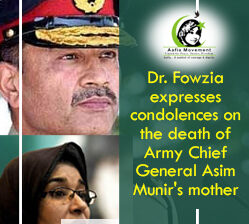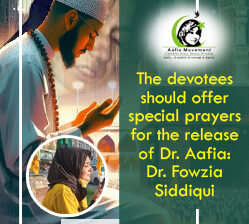Dinner with the family of Aafia Siddiqui
31 August 2010
by Asim Qureshi
I’m in Karachi and as is my custom, I ring Fowzia Siddiqui (the sister of Aafia Siddiqui) in order to meet and catch up with the latest on the case. As always I am greeted well and invited to the home to break fast with them in the evening. I graciously accept and at the appointed time make my way to Gulshan-e-Iqbal where the family live.
Two guards with machine guns are waiting outside the house as I approach in my car, they are camped next to a 10 foot banner spanning the wall of the house requesting that the US release Dr Aafia Siddiqui. The whole scene is a reminder of the efforts that the family have gone to in order that they can secure her release, but at the same time a reminder of the danger that the family face from authorities who are keen to cover their complicity in the detention and abuse of Aafia.
I am told later that that very day a car pulled up outside the back wall of the house and two men were summarily executed as those within the house heard shots. It is Fowzia’s daughter who witnessed the dead bodies of two men who have been shot in the face while she was playing with her birds – another reminder to the family of the dangerous times and place they live in. Human life has very little value in Pakistan, and the family have to cope with the knowledge that no human in the country is beyond having a price put on their heads, particularly if they become a problem for their enemies.
I enter a white gate into a sea of green and pink as creepers with their flowers cover entire walls of the house. I am not surprised to find that the veranda where Fowzia likes to sit is already occupied by a small army of volunteers and campaign managers. Every time I have visited them I have been confronted by the same scene as individuals from all over the country come to this central location to figure out how they can be of some service. I am met by her usual staff who have been with her every step of the way, but this time I am also introduced to a professor at the local university who is an expert in mass communication and is trying to lend his support to the campaign. It seems that there is never a shortage of support or effort.
Fowzia herself doesn’t change – she still has the same energy that I noticed the very first time I spoke with her on her phone. She speaks fast but knows exactly what she wants to get across as the litany of difficulties she has faced come streaming out, interspersed with sighs of exasperation as the hopelessness of their situation weighs heavy upon her shoulders. Like Amina Masood Janjua in Islamabad, Fowzia Siddiqui has become a symbol of the difficulties that Pakistanis have faced in the War on Terror – the burden of such responsibility is not lost on her as she struggles to juggle her role at Aga Khan University Hospital, Aafia’s campaign and her home life.
The time comes for us to break our fast, in what can only be described as a banquet that has been prepared, except, due to the sheer number of those entering the house all the time, this amount of food is required on a daily basis. Fowzia tells me that even at a time when their family had nothing at all, their father required that their door be open to all those who wished to eat – such is the environment in which they were raised.
While Fowzia is deep in conversation with those around her at the table, it becomes evident that the force behind the food is not so much Fowzia as it is Ismet, her mother. She walks around the table renewing the food in each plate all the while making suggestions and explaining what each item is. This is the first time I have met her as previously she has been shy to meet with outsiders due to the suffering she has been forced to endure. She occasionally breaks out in strained pleas about Aafia, the focus of her concern not being on the wider political implications of the case, but rather whether or not Aafia is being given sahoor or iftaar on time during Ramadan. It is hard listening to her because despite her hospitality, there is immense pain in each syllable that she speaks.
The kids of the household walk around us playing with the cats. Aafia’s daughter Maryam has already gone to sleep but I finally have the opportunity to meet Ahmed – a child who has grown tall very quickly and who seems to be somewhat of a gentle giant. He greets all the guests warmly and it is clear from the way the locals speak with him that he has integrated into the house and looks happy within himself. The latest revelations that he told the FBI that his brother was killed on their capture, a fact that completely contradicts the version of events by the US, speaks to the trauma that he has suffered and also to his incredible recovery from that trauma.
There is a strange dynamic in this house – it is evidently filled with the sound of children and so much love, but at the same time there is a wider political significance that simply cannot be ignored.
Originally published here





